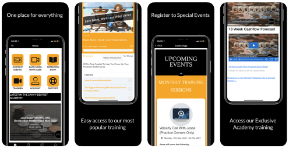Wouldn’t it be incredible if our employees could read our minds?
Well, maybe not all the time…
But if they could anticipate your needs, see your vision for the practice, and feel the same sense of importance and urgency that you do.
A lot of the time, we try our very best to motivate and engage staff – but it only gets so far.
Like the old saying “you can lead a horse to water but you can’t make it drink.”
I mean, you can try the old “It’s my way or the highway” routine, but you know where that will lead, don’t you?
It will lead to staff who put up and shut up long enough to find a new job – and they’ll leave you in the lurch if they can.
That’s a one-way ticket to a tense, resentful, and awkward work environment. And guess what?
Your patients will pick up on that. They’ll notice the staff turnover, they’ll spot the eye-rolling and shared looks, potentially even overhear complaints or gossip.
That’s the last thing you want, right?
So, in a nutshell, you can’t force your staff to do what you want. But that’s not the end of the story.
Because that’s not really what you want. You don’t want to force people to do your bidding. Not really.
What you want is for your staff to want help you. You want them to be aligned with your practice’s culture, to enjoy coming to work, and to take pride in what they do.
You want to share a common goal and work towards it together.
And there are some relatively simple ways to achieve that.
BUILD STRONG RELATIONSHIPS
If you have strong relationships with each member of your team, you’ll be able to bring out their best.
Think about it. You’re more likely to go out of your way to help people you know and care about, aren’t you? The same goes for your team.
It takes a little time to develop strong relationships, but it’s an investment worth making because it pays dividends. It reduces staff turnover and increases patient retention.
READ YOUR TEAM
When you know your staff well, you’ll be able to ‘read’ them. You’ll know their strengths and weaknesses, and you’ll know what motivates them.
You’ll understand who needs more support and guidance, and who can be given brief direction. No one likes to feel as though they’re being micro-managed, but nor do they like to feel as though they have no support at all.
It’s up to you to recognise how much support each person needs, and when they need it. But, if you’re ever in doubt it never hurts to ask!
ASK, DON’T TELL
This seems obvious but asking someone to do something is very different from telling them to do it. When we’re busy and caught up in the hustle and bustle of the working day, sometimes we forget to communicate with intention.
Sometimes simply asking someone for help instead of telling them what to do, makes all the difference in the world.
It’s a simple shift but it builds goodwill by providing the other person the illusion of choice, painting them in a generous light, and allowing them to feel good about themselves.
And that’s exactly how you’d want to feel too, right?
We teach other people how to interact with us every day – in the way we interact with them.
So, these are some fantastic strategies and approaches you can use to get your staff to want to do what you ask.
But you’ll notice that these all require a degree of trust and co-operation.
To get to this level, you really need to have hired the right people and onboarded them well.
We have tonnes of resources around this in our Practice Max Community. Everything from:
- Sample job descriptions that show you how to tailor your language so you find the perfect fit
- Hiring and interview processes to make the best applicant clear
- Onboarding systems that will get your new hire fully operational in record time
- Management assets for you and your practice manager to equip your team for success
- Frameworks and tools for staff evaluation and performance assessment
If you’re interested, be sure to schedule a time for a quick call with us and we can run you through what options are available and let you know more about building a self-managing team.



